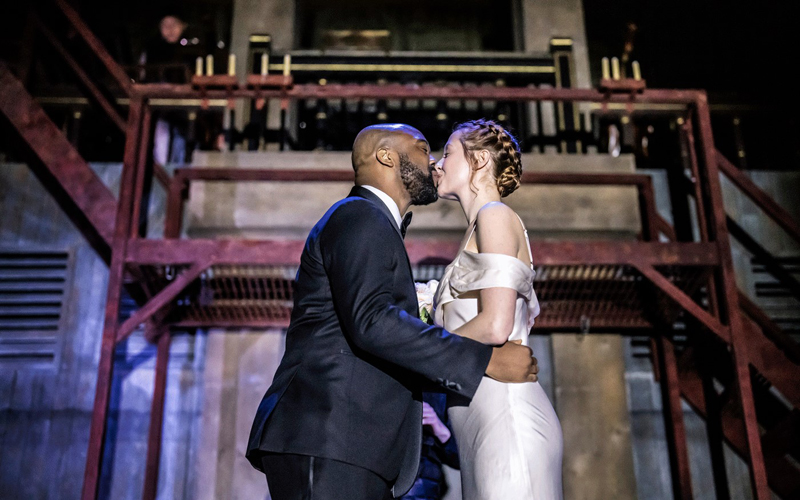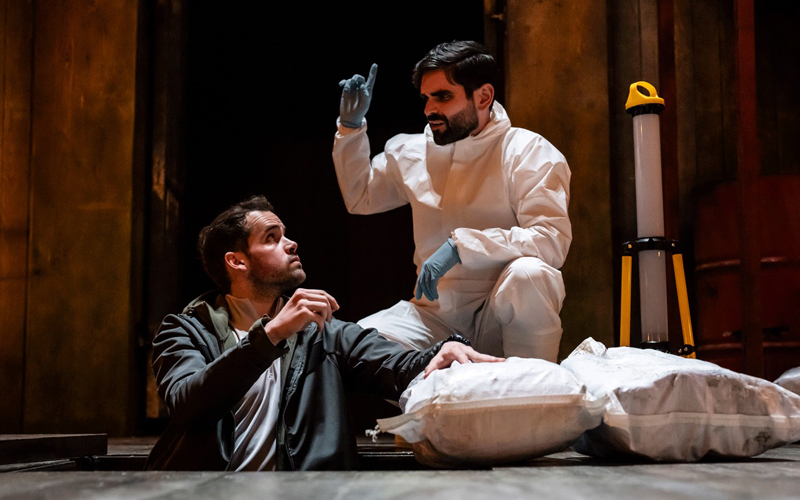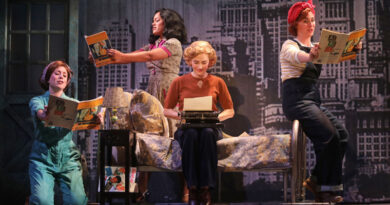“Othello” at Sam Wanamaker Playhouse
Jeremy Malies on the South Bank
4 February 2024
Nicholas Hytner once said that every second line in Iago’s speeches contains a sexual pun. You would need to have done post-doctoral research in Jacobean English to fathom them all, and thankfully many have gone here with none being laboured by Ralph Davis who is convincingly vicious and scheming as directed by Ola Ince. The last Othello I saw had three Iagos. Here, Othello played by Ken Nwosu (Killing Eve) has an alter ego or subconscious younger self (Ira Mandela Siobhan) who shadows him throughout. This approach is an undeniable success but a result of individual excellence.

Ken Nwosu and Poppy Gilbert.
Photo credit: Johan Persson.
A contemporary criticism of the play, often voiced by young people, is that race is not enough these days to establish Othello as an outsider. In this version, all of the characters are Metropolitan Police officers of some kind, but I thought I saw tensions and divisions between Scotland Yard top brass and undercover (probably corrupt) junior staff and career informants who we see travelling around London using the sewers. The super-subtle Venetians from the older generation in the original play become senior police commissioners with aristocratic Desdemona described repeatedly as a Chelsea girl from the King’s Road. Othello’s otherness may be in part be because he is a maverick cop.
Ince sets her production in the East End, and instead of naval maps showing the coast of Cyprus we see post-it notes and facial composites stuck on crime scenes. Nwosu takes a while to relax and truly sit on the pulse of the verse. Only after “Chaos is come again” and a detailed conversation with Iago about Cassio does he catch the innate lyricism of his speeches.
Many signature lines are gone or at least removed from their original context (Ince’s cuts are logical) and reappear in short phrases as garbled control-room radio messages given by supporting cast from the back of the stage and the gallery. Several of the racist epithets for Othello are repositioned here. They become all of a piece with the (uncredited from what I could see) sound design which is imaginative and never relies on predictable effects such as sirens and street noise. Transition from a military society to a police environment works well though I marvelled when Nwosu tells us that the only witchcraft he has used on Desdemona (Poppy Gilbert) is “tales of drug deals gone wrong”.
Gilbert is earnest, transportive, and lissom (willowy even though she has no willow song) when she wants to be. She calibrates her pleading on behalf of Cassio (Oli Higginson) such that we can at least understand how Iago uses it to play on Othello’s insecurity. Gilbert achieves all of this despite Olivia Ward’s costume design which puts her in an unflattering cable-knit jumper throughout. I also wondered about Roderigo (Sam Swann). A crime scene forensic suit makes sense, but the Deliveroo outfit and rucksack looked for (and found) cheap laughs. Perhaps Ward is simply puncturing any credibility that Roderigo has as a suitor for Desdemona? But she leaves Swann with little to work with if this is the case.

Ralph Davis and Sam Swann.
Photo credit: Johan Persson.
The stronger your Iago the more difficult it is for your Othello goes the received wisdom. Davis – as with Ché Walker playing Lodovico – is immediately credible as an imaginative criminal and vicious thug. The pair impress as modern-day Kray gang lieutenants who are intent simply on destroying the happiness of others complete with a dash of Pinter hard-man menace.
Reservations? The barrack-room drinking and singing session is brought forward (for a while I feared there might be a second one) and it proves monumentally boring. For several minutes, as the principals and hangers-on droned through vaguely Mod chants, the whole evening threatened to come to a halt. The chanting is at odds with original incantatory jazz composed by Ivor Novello Award winner Renell Shaw which bookends the action. It is under the direction of Rio Kai who also plays double bass.
Charlotte Bate disappoints as Emilia. She could usefully acquire a few more gestures, and the big almost set-piece conversation with Desdemona about fidelity proves leaden. Bate is not helped by Ince’s direction at the climax. Do contemporary directors not appreciate that, as written, Emilia makes it quite clear she is petrified to be closeted next to a murderer with no escape route, something that could have been made plain through the playhouse’s layout and Amelia Jane Hankin’s set design? Elsewhere, the design featuring sacks of contraband, weapon caches, and the paraphernalia of criminal investigations is evocative without getting in the way of the many superb fights choreographed by Yarit Dor.
Othello’s alter ego? It’s a wonderful idea and well executed. The decision as to whether or not to strangle Desdemona is placed on a knife edge with the inventive resourceful Siobhan (who is silent save for a few lines at the climax) conjuring up Othello’s memories of his early courtship and wedding day in an attempt to dissuade him from the act. Siobhan has some agency in the final bedchamber scene. Here, candlelight designer Anna Watson illuminates Desdemona around a bed resembling a boat. The play on words in which Nwosu reflects that he can relight his own candle but not revive an extinguished Desdemona is there for everybody but avoids being clunky.
A New York tourist next to me on a tailored whistle-stop trip around the capital had misread his itinerary and been rushed here by his guide in the expectation of seeing Guys and Dolls. He got a gangland backdrop of sorts, told me that he was surprised not to see people standing in the pit, and declared himself impressed and moved by this inventive production of Othello.









